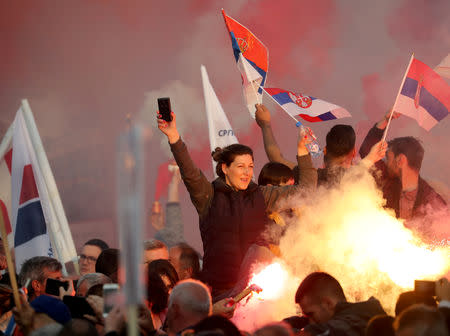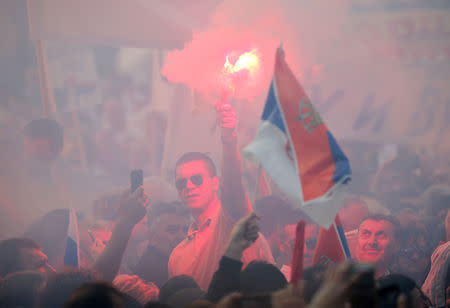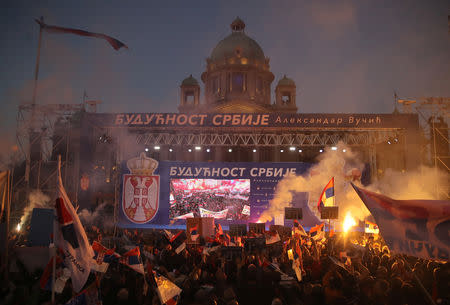Thousands rally in Belgrade to support Serbia's president Vucic
By Aleksandar Vasovic and Ivana Sekularac
BELGRADE (Reuters) - Thousands of people from all over Serbia flocked to Belgrade's city centre on Friday in a show of support for President Aleksandar Vucic, who has faced five months of opposition protests.
In a lengthy speech to the rally, Vucic called for a dialogue with the opposition, adding, "But we are not going to take any ultimatums".
The crowd, rallied by a band of drummers, waved with signal flares and Serbian flags, chanting "Aco (Aleksandar abbreviated) the Serb" as Vucic took the stage in front of the country's parliament building.
"We have no man better suited to lead us than Vucic, he is the saviour of Serbia," said Nevenka, 28, a waitress from the southern city of Nis who gave only her first name.
Vucic, an ultranationalist during the Balkan wars in the 1990s, embraced European values before coming to power in 2012. In coalition with the Socialists of Foreign Minister Ivica Dacic he controls 160 deputies in the 250-seat parliament.
The opposition, which started weekly protests in December, accuses him of stifling media freedoms and turning a blind eye to corruption and what they call the "criminal activities" of his close associates including his brother. Vucic strongly denies the allegations.
"Today is the day for our Serbia," Vucic told the crowd.
SEEKING SUPPORT FOR KOSOVO DEAL?
Some analysts said Friday's rally, a grand finale of Vucic's "The Future of Serbia" campaign, was an attempt to cement popular support ahead of a long-awaited landmark deal with Kosovo, Serbia's former southern province.
Predominantly ethnic Albanian Kosovo declared independence in 2008, almost a decade after a bloody war there. It won recognition from the United States and most EU countries, but not from Serbia or its big power patron Russia, and relations between Belgrade and Kosovo remain tense.
A binding agreement on normalisation of ties is a precondition for both countries to join the European Union.
"To sign any deal with Kosovo, he needs to show that he has strong popular support because nationalists will not like it," said Djordje Pavicevic, professor at the Political Sciences Faculty. "On the other hand if there is no deal, pro-EU forces in the country will complain."
Vucic said in an interview last month that failure to revive talks between Serbia and Kosovo on normalising relations could destabilise the Western Balkan region, which is still recovering from the wars of the 1990s.
Vucic is due to meet the presidents of China and Russia, Xi Jinping and Vladimir Putin in Beijing next week and a week later he is expected to meet the leaders of Germany and France, Angela Merkel and Emmanuel Macron. Local media have reported that Kosovo will be the main topic of the talks.
Vucic is maintaining a delicate balancing act between Serbia's EU aspirations and close ties with Russia and China.
Many Serbs remain opposed to his rule. Dragana, a nurse from central Serbia, said she did not come to Friday's rally voluntarily.
"I had a choice, to decline and lose my job in the (state) hospital, or to be here,” said Dragana, who declined to give her last name.
"They cannot win my mind, I must be here, but tomorrow I will join our real (opposition) protest against injustice and ... this ridiculousness."
(Editing by Frances Kerry)





